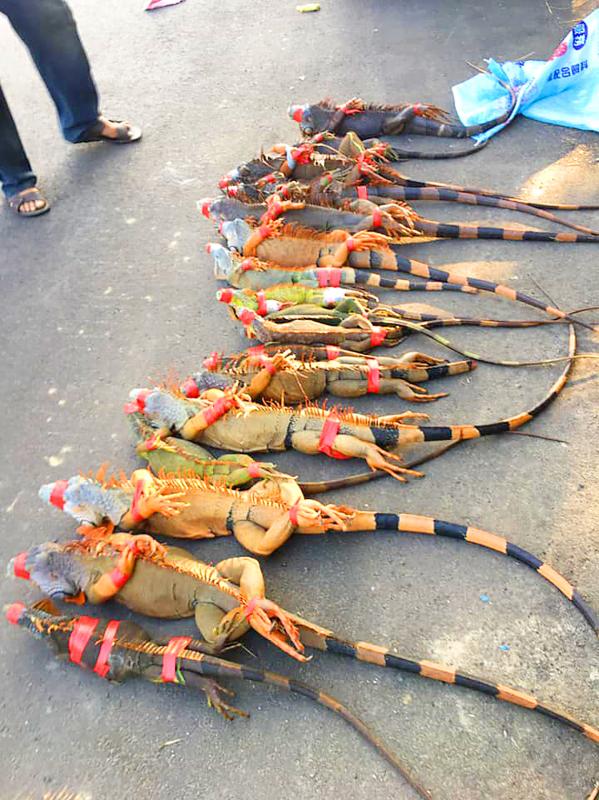The Council of Agriculture (COA) on Wednesday raised alarm over a dramatic increase in the invasive green iguana population, as the number of the animals captured in the wild has grown more than 27-fold over the past five years.
The import and sale of the reptile, also known as the American iguana, was legalized in 2001, and they soon became popular as pets.
However, many green iguanas were likely released into the wild by their owners as they grew to their full size of up to 1.5m.

Photo: Lin Yi-chang, Taipei Times
In the absence of natural predators, their numbers have multiplied, destroying crops and threatening native ecosystems.
The number of iguanas captured in the wild has grown exponentially over the past five years, starting from 527 in 2016, Forestry Bureau Conservation Division Director Lo Yu-chuan (羅尤娟) said.
In 2016, 527 of the reptiles were captured, followed by 2,365 in 2017, 3,657 in 2018, 8,068 last year and 14,536 so far this year, she said.
They have been found in Taichung, Tainan and Kaohsiung, as well as Changhua, Yunlin, Chiayi, Pingtung and Taitung counties, with the largest populations in Kaohsiung and Pingtung, Lo added.
Green iguanas spread quickly, as they lay 40 to 70 eggs at a time, Lo said, adding that the reptiles mostly live on river banks, ponds or irrigation ditches, where they dig holes for their eggs.
As the iguanas eat young buds and leaves, they pose a danger to crops and native species that feed on similar plants, she said.
The bureau has rejected all applications for imports of green iguanas since June 2015 and assisted local governments in eradication efforts, Lo said.
In September, green iguanas were labeled “exotic wildlife dangerous to the environment, people or animals,” and owners were required to register their pets.
The bureau said that 653 of the reptiles were registered by the Nov. 30 deadline.
Apart from green iguanas bred with permission for educational and research purposes, those caught breeding the reptiles are fined NT$10,000 to NT$50,000, the bureau added.
Native to Central and South America, the green iguana is considered an invasive species in 15 countries or regions.

Taiwan has received more than US$70 million in royalties as of the end of last year from developing the F-16V jet as countries worldwide purchase or upgrade to this popular model, government and military officials said on Saturday. Taiwan funded the development of the F-16V jet and ended up the sole investor as other countries withdrew from the program. Now the F-16V is increasingly popular and countries must pay Taiwan a percentage in royalties when they purchase new F-16V aircraft or upgrade older F-16 models. The next five years are expected to be the peak for these royalties, with Taiwan potentially earning

STAY IN YOUR LANE: As the US and Israel attack Iran, the ministry has warned China not to overstep by including Taiwanese citizens in its evacuation orders The Ministry of Foreign Affairs (MOFA) yesterday rebuked a statement by China’s embassy in Israel that it would evacuate Taiwanese holders of Chinese travel documents from Israel amid the latter’s escalating conflict with Iran. Tensions have risen across the Middle East in the wake of US and Israeli airstrikes on Iran beginning Saturday. China subsequently issued an evacuation notice for its citizens. In a news release, the Chinese embassy in Israel said holders of “Taiwan compatriot permits (台胞證)” issued to Taiwanese nationals by Chinese authorities for travel to China — could register for evacuation to Egypt. In Taipei, the ministry yesterday said Taiwan

Taiwan is awaiting official notification from the US regarding the status of the Agreement on Reciprocal Trade (ART) after the US Supreme Court ruled US President Donald Trump's global tariffs unconstitutional. Speaking to reporters before a legislative hearing today, Premier Cho Jung-tai (卓榮泰) said that Taiwan's negotiation team remains focused on ensuring that the bilateral trade deal remains intact despite the legal challenge to Trump's tariff policy. "The US has pledged to notify its trade partners once the subsequent administrative and legal processes are finalized, and that certainly includes Taiwan," Cho said when asked about opposition parties’ doubts that the ART was

If China chose to invade Taiwan tomorrow, it would only have to sever three undersea fiber-optic cable clusters to cause a data blackout, Jason Hsu (許毓仁), a senior fellow at the Hudson Institute and former Chinese Nationalist Party (KMT) legislator, told a US security panel yesterday. In a Taiwan contingency, cable disruption would be one of the earliest preinvasion actions and the signal that escalation had begun, he said, adding that Taiwan’s current cable repair capabilities are insufficient. The US-China Economic and Security Review Commission (USCC) yesterday held a hearing on US-China Competition Under the Sea, with Hsu speaking on